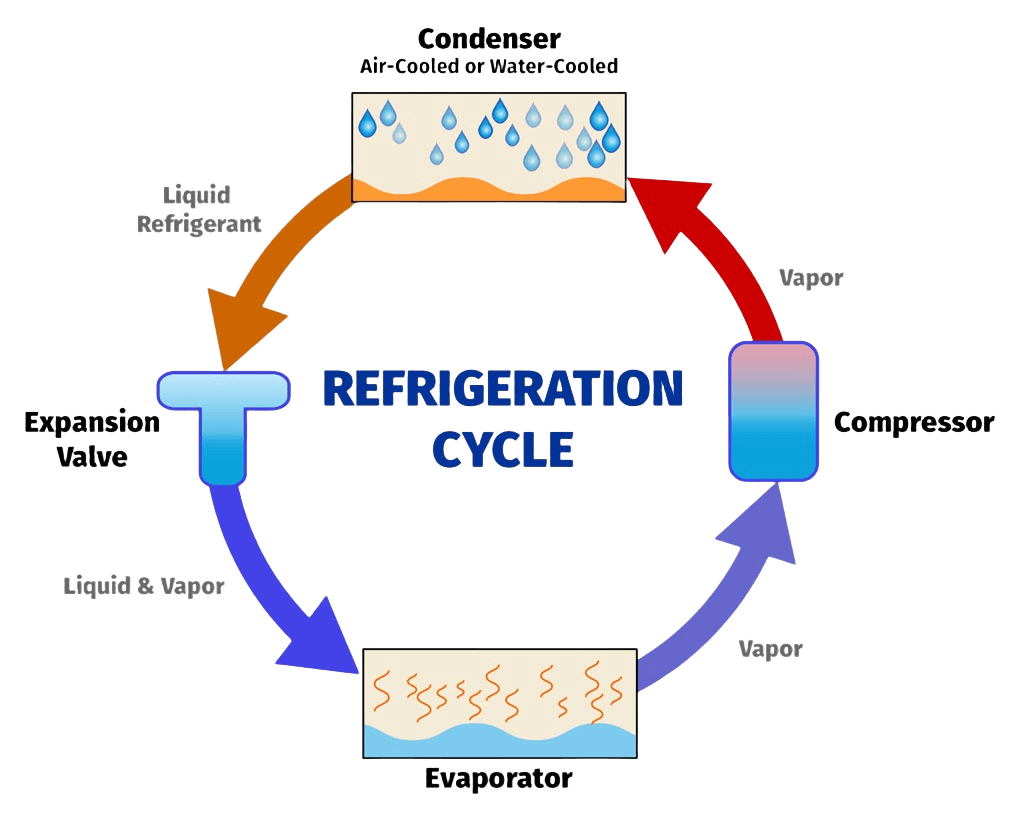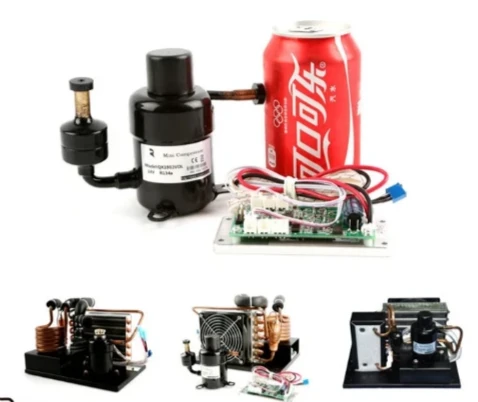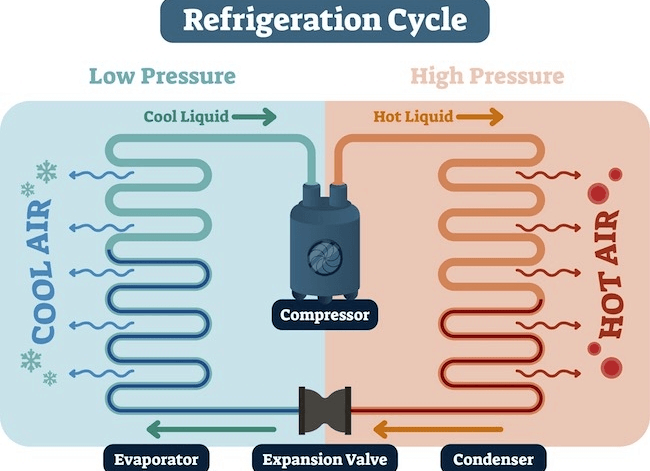Introduction

"RIGID is a miniature refrigerated compressor innovation leader in China. We keep looking for novel solutions in compact and portable cooling systems. We capture new technologies in mobile and compact cooling systems."
Refrigeration compressors are the unsung heroes of our cooling systems, tirelessly working behind the scenes to ensure our food stays fresh and our drinks remain cold. Understanding refrigeration compressors is essential for anyone interested in how modern cooling technology operates. With a variety of types available, each designed for specific applications, it’s crucial to delve into what makes these devices tick.
Understanding Refrigeration Compressors
At their core, refrigeration compressors are mechanical devices that play a pivotal role in the refrigeration cycle. They compress refrigerant gas, raising its pressure and temperature before circulating it through the system. This basic functionality is integral to understanding what does a compressor do in a refrigeration system and highlights its importance in maintaining optimal temperatures.
Importance of the Compressor in Cooling
The compressor acts as the heart of any cooling system, driving the entire process of heat exchange that keeps environments comfortable or preserves perishables. Without it, temperature regulation would be impossible, leading to spoilage or discomfort. Therefore, grasping what is the function of the compressor becomes vital when considering why do we need a compressor in both household and commercial applications.
Overview of Compressor Types
There are several types of compressors used in refrigerators today—each with unique characteristics tailored to specific needs. From reciprocating and rotary compressors to scroll and screw varieties, understanding these differences can clarify which option best suits various cooling requirements. Additionally, innovations like RIGID mini compressors have emerged as game-changers in compact refrigeration solutions, showcasing how technology continues to evolve within this essential industry.
What is a Refrigeration Compressor?

A refrigeration compressor is a crucial component in any cooling system, acting as the heart that circulates refrigerant throughout the system. Essentially, it compresses low-pressure refrigerant vapor into high-pressure gas, enabling the heat exchange process necessary for cooling. This vital function answers the question: what does a compressor do in a refrigeration system?
Definition and Basic Functionality
At its core, a refrigeration compressor is designed to increase the pressure of refrigerant vapor, allowing it to flow through various components of the refrigeration system. By compressing the vapor, it raises both its temperature and pressure, which are essential for efficient heat exchange in cooling applications. So when we ask, What is the function of the compressor? it's all about facilitating this critical cycle that keeps our refrigerators and air conditioners working effectively.
Key Components of a Compressor
Understanding what makes up a refrigerator compressor helps clarify how it operates within a cooling system. Key components include the motor, piston or scroll mechanism (depending on type), valves, and crankshaft—all working together to perform compression efficiently. These elements play significant roles in determining how well a compressor functions and ultimately influence energy efficiency and performance—two factors crucial for answering why we need a compressor in both household and commercial settings.
The Role of RIGID in Compressor Innovation
RIGID stands out as an innovator in mini compressors within China’s competitive market landscape. They focus on developing cutting-edge technologies for mobile and compact cooling systems that enhance functionality while keeping energy consumption low. With their commitment to superior design and quality control, RIGID not only leads advancements but also ensures reliability—key factors when considering what happens when the compressor goes out in a refrigerator or any other appliance reliant on effective cooling solutions.
What Does a Compressor Do in a Refrigeration System?

The compressor plays a pivotal role in the refrigeration system, acting as the heart that circulates refrigerant and maintains the cooling cycle. Understanding what does a compressor do in a refrigeration system is essential for anyone interested in how these appliances function effectively. It not only compresses the refrigerant but also regulates pressure and temperature, ensuring optimal performance.
The Compression Cycle Explained
At its core, the compression cycle is where the magic happens. The compressor takes low-pressure refrigerant gas from the evaporator and compresses it into high-pressure gas, which is crucial for maintaining cooling efficiency. This process raises both the temperature and pressure of the refrigerant, allowing it to flow through various components of the system.
Understanding what is the function of the compressor further emphasizes its importance; it essentially transforms low-energy gas into high-energy vapor that can absorb heat from inside your refrigerator or air conditioning unit. Without this step, there would be no cooling effect as heat exchange relies on this transformation to occur seamlessly. So when you ask yourself why do we need a compressor? Remember that it’s fundamental for initiating this entire cycle.
How Refrigerant Flows Through the System
Once compressed, the high-pressure refrigerant gas flows through coils located outside your refrigerator or air conditioning unit—this is where things get interesting! As it travels through these coils, it releases heat to its surroundings while transforming back into a liquid state due to condensation. This liquid then flows back into the evaporator where it absorbs heat again, completing another loop of circulation.
What does a compressor do in a cooling system? It ensures that this flow remains constant by maintaining appropriate pressure levels throughout each phase of operation. If any part of this flow gets disrupted—such as when we ponder what happens when the compressor goes out in a refrigerator—the entire cooling cycle can falter, leading to inefficient performance or even appliance failure.
Understanding Heat Exchange in Cooling
Heat exchange is critical for effective refrigeration; without proper heat transfer mechanisms, your refrigerator would simply warm up instead of cool down! The role of heat exchange becomes evident once we understand how compressors facilitate this process by moving refrigerants between different states—gas and liquid—while transferring thermal energy efficiently.
In essence, understanding types of compressors in refrigerators helps us appreciate their unique contributions to heat exchange processes within various systems available today—from reciprocating units to RIGID's innovative mini compressors designed specifically for compact applications! Each type has its advantages depending on specific needs but all share one common goal: efficient cooling through effective heat management.
What is the Function of the Compressor?

The compressor plays a pivotal role in any refrigeration system, acting as the heart that drives the entire cooling process. Essentially, it compresses refrigerant gas, increasing its pressure and temperature, allowing it to circulate through the system. This function is crucial for maintaining optimal temperature control in both household and commercial applications.
Pressure Regulation and Temperature Control
One of the primary functions of a compressor is pressure regulation within a refrigeration system. By compressing refrigerant gas, it raises its pressure significantly, which is essential for facilitating heat exchange in cooling systems. Without effective pressure regulation, maintaining desired temperatures in refrigerators or air conditioning units would be nearly impossible.
Temperature control is intrinsically linked to what does a compressor do in a refrigeration system; it ensures that the refrigerant can absorb heat from inside the fridge or freezer and release it outside. This continuous cycle keeps your food fresh and your drinks cold, showcasing why we need a compressor for efficient cooling solutions. If there's an issue with this function, such as when what happens when the compressor goes out in a refrigerator occurs, you can expect drastic changes in temperature regulation.
The Impact on Energy Efficiency
Energy efficiency is another significant aspect of what does a compressor do in a cooling system. A well-functioning compressor optimizes energy consumption by ensuring that only necessary amounts of energy are used to maintain desired temperatures. When compressors operate efficiently, they not only save on electricity bills but also contribute to environmental sustainability by reducing overall energy use.
Moreover, different types of compressors in refrigerators have varying impacts on energy efficiency levels. For instance, RIGID's mini compressors are designed with cutting-edge technology that enhances performance while minimizing power consumption—making them ideal for modern refrigeration needs. As consumers become more eco-conscious, understanding how compressors contribute to energy efficiency becomes increasingly vital.
How Compressors Enhance Appliance Performance
Compressors greatly enhance appliance performance by ensuring consistent operation under various conditions. They enable refrigerators and air conditioners to adapt quickly to changes in temperature demand—be it due to frequent door openings or ambient temperature fluctuations outside your home or business environment. This adaptability ensures appliances work effectively without unnecessary wear and tear.
Furthermore, having reliable compressors can extend the lifespan of appliances significantly; after all, no one wants to deal with what happens when the compressor goes out in a refrigerator! Brands like RIGID focus on creating high-quality mini compressors that not only improve performance but also cater specifically to customer requirements with custom-made solutions tailored for unique applications in micro refrigeration systems.
Why Do We Need a Compressor?

Refrigeration compressors are essential components in both household and commercial cooling systems. They play a pivotal role in maintaining the desired temperature by facilitating the refrigeration cycle, ensuring food safety and comfort. Without a compressor, the entire cooling process would come to a halt, making it clear why we need a compressor in our daily lives.
Importance in Household and Commercial Refrigeration
In households, refrigerator compressors are vital for preserving food and beverages, preventing spoilage and waste. In commercial settings, such as restaurants or supermarkets, what does a compressor do in a refrigeration system? It ensures that perishable goods remain fresh and safe for consumption while maintaining optimal storage conditions. The reliability of these appliances hinges on the function of the compressor; without it, both home kitchens and large-scale operations would face significant challenges.
Consequences of Compressor Failure
What happens when the compressor goes out in a refrigerator? The consequences can be dire—food spoilage, financial loss, and inconvenience are just some of the issues that arise from compressor failure. Additionally, understanding what is the function of the compressor helps us appreciate its role; when it malfunctions, not only does temperature regulation suffer but energy efficiency plummets as well.
RIGID's Contribution to Modern Refrigeration Needs
RIGID stands out as an innovation leader in mini compressors within China’s refrigeration landscape. By focusing on compact cooling solutions tailored to meet diverse client needs—such as micro refrigeration & air conditioning applications—they exemplify how modern technology can enhance performance while addressing budget constraints. As we explore types of compressors in refrigerators today, RIGID's commitment to superior design and quality showcases their vital role in shaping efficient cooling systems that cater to contemporary demands.
What Happens When the Compressor Goes Out in a Refrigerator?

When the compressor fails in a refrigerator, it can lead to a cascade of issues that disrupt the cooling process. Understanding what happens when the compressor goes out is crucial for both household and commercial refrigeration users. The compressor is integral to maintaining optimal temperatures, so its failure can have significant consequences.
Common Symptoms of Compressor Failure
Identifying compressor failure early can save you from costly repairs or spoiled food. One common symptom is an unusual noise coming from the refrigerator, which may indicate that the compressor is struggling to operate efficiently. Additionally, if your refrigerator isn't cooling properly or if there are warm spots inside, it’s likely that you’re experiencing issues with what does a compressor do in a refrigeration system.
Another telltale sign is excessive cycling—when the refrigerator frequently turns on and off without maintaining consistent temperatures. This erratic behavior not only affects cooling performance but also raises questions about what is the function of the compressor? If your appliance shows these symptoms, it's time to investigate further.
Potential Repairs and Replacements
When faced with a failing refrigerator compressor, you generally have two options: repair or replacement. Minor issues like electrical problems or refrigerant leaks might be fixable without needing to replace the entire unit. However, if your appliance has an older model or extensive damage, understanding why we need a compressor becomes vital; replacing it may be more cost-effective than trying to salvage an outdated part.
In many cases, professional technicians can diagnose whether repairs will suffice or if it's time for a new unit altogether. For newer models equipped with advanced technologies like those offered by RIGID, replacement might also mean upgrading to more efficient types of compressors in refrigerators that enhance performance and energy efficiency.
Prevention and Maintenance Tips
Preventing compressor failure starts with regular maintenance practices that ensure your refrigerator remains in peak condition. Cleaning condenser coils regularly helps improve airflow and efficiency while reducing strain on what does a compressor do in a cooling system? Additionally, keeping door seals clean and intact prevents warm air from entering and causing unnecessary work for the compressor.
Monitoring temperature settings can also help maintain optimal conditions; set your fridge between 35°F and 38°F (1°C - 3°C) for best results. Lastly, consider investing in quality components like those from RIGID; their innovative mini compressors are designed for reliability and efficiency—making them an excellent choice for anyone looking to avoid future headaches related to refrigeration systems.
Types of Compressors in Refrigerators

When it comes to the types of compressors in refrigerators, understanding the differences can significantly impact performance and energy efficiency. Each type serves a unique purpose and functions differently, which is crucial when considering what does a compressor do in a refrigeration system. From household appliances to commercial units, knowing these distinctions helps consumers make informed choices.
Reciprocating vs. Rotary Compressors
Reciprocating compressors are among the most common types found in refrigerators, utilizing pistons to compress refrigerant gas. This design allows for effective pressure regulation and temperature control, answering the question: what is the function of the compressor? On the other hand, rotary compressors operate using rotating mechanisms that provide smoother operation and quieter performance, making them popular in modern cooling systems.
Both reciprocating and rotary compressors have their pros and cons regarding energy efficiency and maintenance needs. While reciprocating compressors are known for their robustness, rotary compressors tend to be more compact and quieter during operation. Ultimately, understanding these two types aids consumers in recognizing why we need a compressor for reliable refrigeration solutions.
Understanding Scroll and Screw Compressors
Scroll compressors utilize two spiral-shaped scrolls that compress refrigerant gas as they orbit around each other; this design enhances reliability while reducing vibration levels significantly. What does a compressor do in a cooling system? Essentially, scroll compressors offer efficient compression with minimal noise—ideal for residential refrigerators where peace is paramount.
Screw compressors are typically used in larger commercial applications due to their ability to handle high capacities efficiently. They work by using two interlocking screws that compress refrigerant continuously as it flows through them. This design not only maximizes energy efficiency but also plays an essential role when discussing what happens when the compressor goes out in a refrigerator—failing screws can lead to significant operational challenges.
The Emergence of RIGID Mini Compressors
RIGID mini compressors represent an exciting innovation within the refrigeration industry, particularly for mobile and compact cooling systems. These miniature powerhouses are designed with superior quality while ensuring they meet specific client needs—perfectly addressing why do we need a compressor that’s both efficient and versatile! RIGID's commitment to capturing new technologies has positioned them as pioneers in micro cooling applications.
As demand grows for smaller yet powerful refrigeration solutions, RIGID's mini compressors are becoming increasingly popular across various sectors—from racing coolers to micro DC air conditioning systems. Their focus on custom-made solutions allows them to cater directly to clients’ budgets while enhancing competitiveness within the market landscape. With RIGID leading this charge, it’s clear that understanding different types of compressor technology is vital for anyone looking into modern refrigeration options.
Conclusion

In summary, refrigeration compressors are the unsung heroes of cooling systems, playing a vital role in maintaining optimal temperatures for both household and commercial applications. By understanding what does a compressor do in a refrigeration system, we can appreciate its significance in regulating pressure and enhancing energy efficiency. From preventing spoilage of food to ensuring comfort in our living spaces, the function of the compressor is undeniably crucial.
The Essential Role of Refrigeration Compressors
What is the function of the compressor? Essentially, it compresses refrigerant gas, raising its pressure and temperature before circulating it through the system. This process not only facilitates heat exchange but also ensures that appliances operate efficiently, thus answering the question: why do we need a compressor? Without these devices, refrigerators would fail to maintain cool environments, leading to food spoilage and increased energy consumption.
RIGID's Influence on Refrigeration Technology
RIGID stands out as an innovative leader in mini compressor technology in China, pushing boundaries with superior designs tailored for mobile and compact cooling systems. Their commitment to quality and customer satisfaction has made them pioneers in micro cooling applications like small chillers and direct cooling solutions. By focusing on custom-made refrigeration solutions that meet specific requirements, RIGID has transformed how we understand types of compressors in refrigerators today.
Ensuring Reliability and Efficiency in Cooling Systems
Understanding what happens when the compressor goes out in a refrigerator can be alarming; symptoms often include warm food or unusual noises that signal trouble ahead. Regular maintenance is key to preventing such issues while ensuring reliability and efficiency across all cooling systems. As we look towards future innovations from companies like RIGID, it's clear that advancements will continue to enhance performance while addressing modern refrigeration needs.